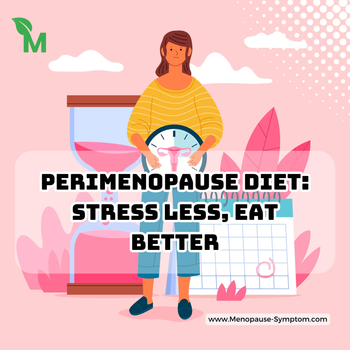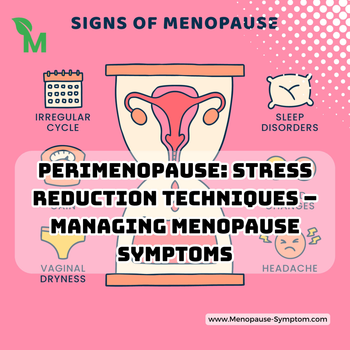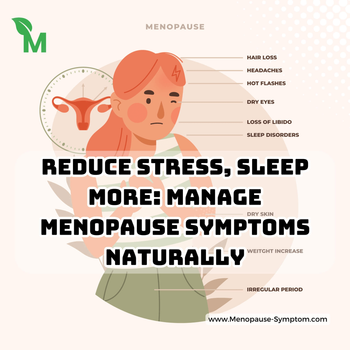Perimenopause: Stress Reduction Techniques – Managing Menopause Symptoms
On
07/10/2024Reading time:
9 min
Summary:
Perimenopause is the stage that many women go through before the official menopause. This stage begins around age 40 to 50 and it usually lasts from a few months to a few years, bringing with it many physical and psychological changes that many women may not be prepared for.
One of the biggest challenges of perimenopause is the symptoms it brings, including hot flashes, mood swings, and sleep disturbances, which can make women more stressed and irritable.
5 common symptoms that cause stress during perimenopause:
· Hot flashes: A sudden feeling of heat that spreads throughout the body, often accompanied by flushing of the face, neck, and sweating. This is one of the most characteristic and uncomfortable symptoms of perimenopause.
· Menstrual disorders: Menstruation becomes irregular, menstrual blood volume changes, and may even stop for a period of time.
· Mood swings: Emotions become erratic, irritable, anxious, depressed. Hormonal changes can affect the psychology, making women susceptible to stress and fatigue.
· Sleep disorders: Difficulty sleeping, insomnia, and poor sleep are common problems in premenopausal women. This further increases the feeling of fatigue and stress.
· Other health problems: Vaginal dryness, headaches, muscle and joint pain, weight gain, and rapid heartbeat are also common symptoms.
Factors that can aggravate premenopausal symptoms:
· Smoking: Smoking reduces estrogen levels and can cause early menopause.
· Unhealthy diet: Lack of essential nutrients can increase premenopausal symptoms.
· Stress: Prolonged stress can aggravate symptoms and affect overall health.
To control these symptoms, applying stress reduction techniques becomes necessary.
Stress can aggravate perimenopause and menopause symptoms. As the body goes through these changes, estrogen levels drop, leading to an imbalance in the body. Increased stress can make many symptoms worse. Therefore, finding ways to reduce stress not only improves mood but is also an effective method to control perimenopause and menopause symptoms.
An important technique to reduce stress is practicing yoga. Yoga not only helps improve physical health but also has a positive impact on the mind. Through breathing exercises, stretching and meditation, yoga can help relax muscles, increase flexibility and improve mood. Many studies have shown that regular yoga practice can reduce symptoms of anxiety, depression and improve sleep quality - all of which are factors that affect perimenopause and menopause.
Besides yoga, meditation is also one of the effective methods to reduce stress. Meditation helps calm the mind, clear stressful thoughts, and improve concentration. Just a few minutes a day of meditation can significantly improve your emotional state and create moments of peace in your mind. Reducing stress through meditation can also help reduce the frequency and severity of hot flashes that are common during perimenopause.
A healthy diet is also important in managing perimenopause symptoms. Foods rich in phytoestrogens, such as soy and beans, can help balance hormones and reduce symptoms. Staying hydrated and eating foods rich in vitamin D and calcium are also important to support bone health and reduce the risk of osteoporosis as you enter menopause.
Physical activity is also helpful in reducing stress and improving overall health. Regular exercise not only improves physical health, but also reduces stress, improves mood, and enriches life. Exercises such as walking, swimming or cycling can help release negative energy and stimulate the production of the happy hormone - serotonin, which is extremely beneficial during perimenopause and menopause.
Additionally, maintaining social connections is also an important factor in managing stress. When you are feeling anxious or struggling, talking to friends and family can help reduce feelings of loneliness and stress. Join a support group or community activity to connect and share your experiences with others going through perimenopause or menopause.
For many women, intensive therapy is also a helpful option. Therapies such as cognitive behavioral therapy (CBT) can help women better understand their emotions and find effective ways to manage stress and symptoms associated with perimenopause..
Practicing self-care also plays a big role in managing perimenopause symptoms. Taking time for yourself and engaging in activities you enjoy can create joy and reduce stress. Relaxing with a favorite book or movie can reduce feelings of stress and create necessary relaxation.
Ultimately, it is important to learn about perimenopause and better understand the process. Knowledge will help you better approach and manage your symptoms, and feel more confident during this transition. Talk to your doctor or take a course to equip yourself with the necessary skills, as well as get support when needed.
In short, managing perimenopause and menopause symptoms is important for women's health and quality of life. It is important to adopt stress reduction techniques such as yoga, meditation, a healthy diet, physical activity and maintaining social relationships. Remember that everyone has their own experience on this journey and it is important to find the methods that work best for you to be able to face perimenopause in a positive and effective way.
Source: Team MPS compiled, analyzed and wrote. Please dont reup without source. Many thanks.

Perimenopause Diet: Stress Less, Eat Better
09.02.2024
Perimenopause is a stage that many women face before officially entering menopause. This is a time that marks major changes in the body, including hormonal imbalances and uncomfortable symptoms.

Perimenopause: Stress Reduction Techniques – Managing Menopause Symptoms
10.04.2024
Perimenopause is the stage that many women go through before the official menopause. This stage begins around age 40 to 50 and it usually lasts from a few months to a few years, bringing with it many physical and psychological changes that many women may not be prepared for.

Reduce Stress, Sleep More: Manage Menopause Symptoms Naturally
09.02.2024
Menopause is a natural phase in every woman's life, usually occurring between the ages of 45 and 55.
